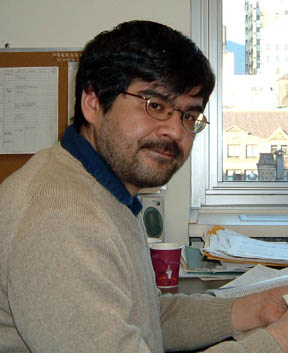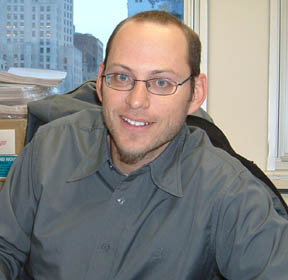|
Web Exclusives: Alumni Spotlight
May 14, 2003:
Take two Princeton alumni, one a scholar of comparative literature and the other a tax lawyer seeking a career change; add a savvy literary agent looking for a new angle; throw in a connection to an Asian country shared by all three. While the ingredients might show potential for a popular novel, in reality they have led — indirectly — to four popular novels, with more on the way. Ioannis Mentzas '94, who majored in comparative literature at Princeton and earned a master's in English at Columbia, and Micah Burch '95, a former tax lawyer, are the editorial and marketing directors, respectively, of Vertical (www.vertical-inc.com), a new publishing company they formed with president Hiroki Sakai, a veteran of Japanese publishing. They believe that the company is filling a void in the American market: the translation, publication, and distribution of contemporary popular Japanese fiction. "Most of the Japanese literature that comes to the United States is highbrow stuff," Mentzas explains, citing classic Japanese literature and books about Japanese culture as examples, "but there is a lot of excellent popular fiction in Japan today." Burch compares the status of the Japanese authors Vertical is translating and publishing to that of America's Stephen King or Elmore Leonard. The company is releasing its first four novels this spring: Koji Suzuki's Ring, the book upon which the recent DreamWorks movie, The Ring, is based; The Leopard Mask, the first book in an 86-volume fantasy series by Kaoru Kurimoto, The Guin Saga, so popular in Japan that all of the volumes are still in print; Twinkle Twinkle by Kaori Ekuni, a novel exploring an unconventional modern marriage; and Ashes by Kenzo Kitakata, a hard-boiled portrait of a Japanese gangster facing middle age and diminished prospects. Fall 2003 will bring four volumes of Osamu Tezuka's Buddha, a serious biography presented in the "graphic novel" format, similar to a comic book. Noted illustrator and author Osamu Tezuka, is sometimes called the "Walt Disney of Japan." Through a network of academics, Sakai found Mentzas in 2001 while looking for an editor for his new literary agency, Magic Works International, hoping to bring Japanese children's books to the U.S. Mentzas was in the midst of his doctoral program at Columbia. "I wasn't looking to go into publishing at all," he says. "I wanted to be a professor. Mr. Sakai wooed me for a bout four months, and he changed my mind." In the course of their conversations, Mentzas persuaded Sakai to change his focus to contemporary fiction for adults; the agency changed its name and became a publishing company. Burch, who studied Japanese and majored in East Asian Studies at Princeton, spent a year in Sendai, Japan, as a Fulbright Scholar before earning his law degree at Harvard. In 2002 he emailed former assistant professor of East Asian studies Soho Machida expressing his lack of fulfillment as a tax lawyer. Machida, who had also taught Mentzas, thought there might be a role for Burch in the new publishing house and suggested he get in touch with Mentzas. Burch changed careers not long after that. The company is small. Besides Burch, Mentzas, and company president Sakai, the other full-time employees are a graphic designer and a representative in Tokyo who is their liaison with Japanese publishers. Their philosophy is one of keeping the company lean, Burch and Mentzas explain, and doing much of the work themselves. Burch says that he and Mentzas end up performing various aspects of the other's job: "Yani does as much marketing as I do, actually, and I help with the editing." The translations are usually done by native English speakers — often graduate students who have studied Japanese. Mentzas, the son of a Greek father and a Japanese mother, lived in Japan from birth to age 18; he checks the English texts to eliminate mistranslations and corrects or retranslates, as necessary. Enjoying these works does not require any particular interest
in or knowledge of Japan, Burch says. "Except for the names,
these novels could be taking place almost anywhere." What Vertical
hopes to bring to America from Japan, Mentzas adds, is "literary
entertainment — something that you read on the train or pick
up after work when you're tired. There is a lot of good popular
Japanese fiction that's been largely ignored over here." With
Vertical, Burch and Mentzas hope to change all that. By A. Melissa Kiser '75 A. Melissa Kiser is the public relations officer at The Pennington School.
Home Current
Issue
Web Exclusives: Headlines - PawPlus - Features Tooke's Take - Varsity Typewriter - Inky Dinky Do Raising Kate - On the Campus - Comparative Life - More... PAW Online Archives - Print Archives - Advertising Info - Reader Services Search the Site - Contact PAW Princeton University - Alumni Links - Alumni Council - Your Class Secretary |
||


